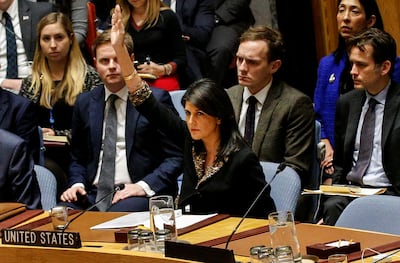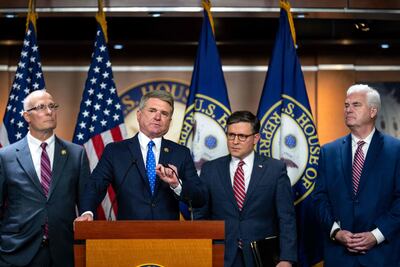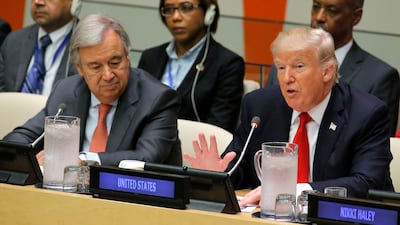Latest updates: Follow our full coverage on the US election
Now that Donald Trump will once again be US President, other countries are bracing for his return to the White House. At the UN, attention is turning to how a second Trump administration could alter the US stance on the Security Council, where it holds a veto and is consistently pro-Israel.
Mr Trump and many Republicans are deeply distrustful of the UN and other international forums. A former Trump-era diplomat to the UN told The National that “respect for the UN has its limits, and the [Trump] administration will refuse to be bogged down in dialogue that hinders its geopolitical vision”.
During Mr Trump's first term in office, his administration antagonised the UN, targeting perceived anti-Americanism and going after agencies it considered corrupt. The diplomat said the Trump administration identified long-standing issues, such as an excessive focus on and criticism of Israel's actions, as barriers to progress.
Under a second Trump term, the diplomat predicted the US would probably withdraw once more from the Human Rights Council and limit engagement with the World Health Organisation and Unesco, as well as block regimes such as Iran or Venezuela from serving on UN committees.
Nikki Haley and Kelly Craft, who were both Mr Trump's UN ambassadors, tried to shift scrutiny from Israel while also countering Beijing’s ambitions to lead various UN agencies, the diplomat added. “We would likely see the UN bypassed more often than under the Biden administration,” they concluded.
The UN is “ready to work constructively” with the new Trump administration, Secretary General Antonio Guterres said in a statement on Wednesday.
Mr Guterres's spokesman Stephane Dujarric told reporters that Mr Guterres had very good relations with Mr Trump.
“The fact they had different opinions about a number of issues was clear to all. I think the Secretary General stated his opinions. The US administration had its policies but it did not stop the Secretary General from engaging with the United States government,” he said.
Republicans from across the party's widening ideological spectrum are sceptical of the UN. Mike McCaul, the Republican chairman of the House foreign affairs committee, said the General Assembly needs to address a “declining ability of the UN to undertake serious reform”.
“While ineffective at solving conflict, the unique role the UN plays in providing humanitarian assistance to innocent civilians suffering from conflict and disaster should be strengthened,” he told The National.
Mr Trump previously came to power with a proposal to slash US diplomacy and aid budgets by roughly one-third, including significant cuts to UN peacekeeping and international organisation funding. However, Congress, responsible for setting the federal budget, resisted these reductions but did halt funding for UNRWA, the UN Relief and Works Agency for Palestine Refugees in the Middle East.
As the largest contributor, the US covers 22 percent of the core UN budget and 27 percent of the peacekeeping budget, with China as the second-largest contributor.
Mr McCaul believes a second Trump administration would establish “rigorous oversight and accountability of UN funds, whether it is money going into Afghanistan or UNRWA”.
Republicans have led a bi-partisan charge in Washington that saw the successful halt on US funds for UNRWA, which under current law will continue until at least 2025. Many Republicans want the agency shut down entirely. Democrats remain critical of UNRWA but some are moving to restore its funding.
Mr Trump withdrew the US from several key UN bodies, including the Human Rights Council, WHO and Unesco, as well as from the Paris climate agreement. Mr McCaul calls such bodies “flawed entities resistant to change”.
If the world body “survived” the Trump administration, it is due largely to Mr Guterres. “It wasn’t something that was obvious … it's something that needs to be said,” another diplomat told The National.
Richard Gowan, the UN specialist at the International Crisis Group, anticipates significant cuts to the UN budget are likely, as many congressional Republicans express strong support for reducing US funding, especially in light of the current geopolitical climate.
Mr Dujarric told reporters that the UN chief had been “very frugal” in managing the money, because “we've had over the last few years been living in a liquidity crisis”.
But there are points of tension between the Republican foreign policy leadership and Mr Trump's more right-wing corner of the party. Party members such as Mr McCaul have forcefully criticised Russia and support packages for Ukraine since Russian President Vladimir Putin's full-scale invasion in 2022.
Mr Trump has described Mr Putin as “pretty savvy” and a “genius,” and has threatened to condition support for fellow Nato countries on them paying 2 per cent of GDP towards defence.
The radical House Freedom Caucus, which most aligns with Mr Trump, have been outliers in Congress with their demands to temper US support to Ukraine. But Mr McCaul says he is optimistic that a second Trump administration would “prioritise putting pro-democracy, anti-authoritarian nominees on crucial boards and subagencies to promote our democratic values” at the UN.
“We need strong American leadership at the UN. This includes when we are standing up for our allies and partners like Israel and Ukraine, and when we are confronting our adversaries,” he added.
“Let’s not forget: the Biden-Harris administration has repeatedly stuck to its policy of appeasement, which has only emboldened our adversaries.”
Mercer, the investment consulting arm of US services company Marsh & McLennan, expects its wealth division to at least double its assets under management (AUM) in the Middle East as wealth in the region continues to grow despite economic headwinds, a company official said.
Mercer Wealth, which globally has $160 billion in AUM, plans to boost its AUM in the region to $2-$3bn in the next 2-3 years from the present $1bn, said Yasir AbuShaban, a Dubai-based principal with Mercer Wealth.
“Within the next two to three years, we are looking at reaching $2 to $3 billion as a conservative estimate and we do see an opportunity to do so,” said Mr AbuShaban.
Mercer does not directly make investments, but allocates clients’ money they have discretion to, to professional asset managers. They also provide advice to clients.
“We have buying power. We can negotiate on their (client’s) behalf with asset managers to provide them lower fees than they otherwise would have to get on their own,” he added.
Mercer Wealth’s clients include sovereign wealth funds, family offices, and insurance companies among others.
From its office in Dubai, Mercer also looks after Africa, India and Turkey, where they also see opportunity for growth.
Wealth creation in Middle East and Africa (MEA) grew 8.5 per cent to $8.1 trillion last year from $7.5tn in 2015, higher than last year’s global average of 6 per cent and the second-highest growth in a region after Asia-Pacific which grew 9.9 per cent, according to consultancy Boston Consulting Group (BCG). In the region, where wealth grew just 1.9 per cent in 2015 compared with 2014, a pickup in oil prices has helped in wealth generation.
BCG is forecasting MEA wealth will rise to $12tn by 2021, growing at an annual average of 8 per cent.
Drivers of wealth generation in the region will be split evenly between new wealth creation and growth of performance of existing assets, according to BCG.
Another general trend in the region is clients’ looking for a comprehensive approach to investing, according to Mr AbuShaban.
“Institutional investors or some of the families are seeing a slowdown in the available capital they have to invest and in that sense they are looking at optimizing the way they manage their portfolios and making sure they are not investing haphazardly and different parts of their investment are working together,” said Mr AbuShaban.
Some clients also have a higher appetite for risk, given the low interest-rate environment that does not provide enough yield for some institutional investors. These clients are keen to invest in illiquid assets, such as private equity and infrastructure.
“What we have seen is a desire for higher returns in what has been a low-return environment specifically in various fixed income or bonds,” he said.
“In this environment, we have seen a de facto increase in the risk that clients are taking in things like illiquid investments, private equity investments, infrastructure and private debt, those kind of investments were higher illiquidity results in incrementally higher returns.”
The Abu Dhabi Investment Authority, one of the largest sovereign wealth funds, said in its 2016 report that has gradually increased its exposure in direct private equity and private credit transactions, mainly in Asian markets and especially in China and India. The authority’s private equity department focused on structured equities owing to “their defensive characteristics.”
Milestones on the road to union
1970
October 26: Bahrain withdraws from a proposal to create a federation of nine with the seven Trucial States and Qatar.
December: Ahmed Al Suwaidi visits New York to discuss potential UN membership.
1971
March 1: Alex Douglas Hume, Conservative foreign secretary confirms that Britain will leave the Gulf and “strongly supports” the creation of a Union of Arab Emirates.
July 12: Historic meeting at which Sheikh Zayed and Sheikh Rashid make a binding agreement to create what will become the UAE.
July 18: It is announced that the UAE will be formed from six emirates, with a proposed constitution signed. RAK is not yet part of the agreement.
August 6: The fifth anniversary of Sheikh Zayed becoming Ruler of Abu Dhabi, with official celebrations deferred until later in the year.
August 15: Bahrain becomes independent.
September 3: Qatar becomes independent.
November 23-25: Meeting with Sheikh Zayed and Sheikh Rashid and senior British officials to fix December 2 as date of creation of the UAE.
November 29: At 5.30pm Iranian forces seize the Greater and Lesser Tunbs by force.
November 30: Despite a power sharing agreement, Tehran takes full control of Abu Musa.
November 31: UK officials visit all six participating Emirates to formally end the Trucial States treaties
December 2: 11am, Dubai. New Supreme Council formally elects Sheikh Zayed as President. Treaty of Friendship signed with the UK. 11.30am. Flag raising ceremony at Union House and Al Manhal Palace in Abu Dhabi witnessed by Sheikh Khalifa, then Crown Prince of Abu Dhabi.
December 6: Arab League formally admits the UAE. The first British Ambassador presents his credentials to Sheikh Zayed.
December 9: UAE joins the United Nations.
The%20specs
%3Cp%3E%3Cstrong%3EEngine%3A%20%3C%2Fstrong%3E3.0%20twin-turbo%20inline%20six-cylinder%0D%3Cbr%3E%3Cstrong%3ETransmission%3A%20%3C%2Fstrong%3Eeight-speed%0D%3Cbr%3E%3Cstrong%3EPower%3A%20%3C%2Fstrong%3E503hp%0D%3Cbr%3E%3Cstrong%3ETorque%3A%20%3C%2Fstrong%3E600Nm%0D%3Cbr%3E%3Cstrong%3EPrice%3A%20%3C%2Fstrong%3Efrom%20Dh400%2C000%20(estimate)%0D%3Cbr%3E%3Cstrong%3EOn%20sale%3A%20%3C%2Fstrong%3Enow%3C%2Fp%3E%0A
Company%20Profile
%3Cp%3E%3Cstrong%3ECompany%3A%3C%2Fstrong%3E%20Astra%20Tech%3Cbr%3E%3Cstrong%3EStarted%3A%20%3C%2Fstrong%3EMarch%202022%3Cbr%3E%3Cstrong%3EBased%3A%20%3C%2Fstrong%3EDubai%3Cbr%3E%3Cstrong%3EFounder%3A%20%3C%2Fstrong%3EAbdallah%20Abu%20Sheikh%3Cbr%3E%3Cstrong%3EIndustry%3A%3C%2Fstrong%3E%20technology%20investment%20and%20development%3Cbr%3E%3Cstrong%3EFunding%20size%3A%3C%2Fstrong%3E%20%24500m%3C%2Fp%3E%0A
PROFILE OF CURE.FIT
Started: July 2016
Founders: Mukesh Bansal and Ankit Nagori
Based: Bangalore, India
Sector: Health & wellness
Size: 500 employees
Investment: $250 million
Investors: Accel, Oaktree Capital (US); Chiratae Ventures, Epiq Capital, Innoven Capital, Kalaari Capital, Kotak Mahindra Bank, Piramal Group’s Anand Piramal, Pratithi Investment Trust, Ratan Tata (India); and Unilever Ventures (Unilever’s global venture capital arm)
New UK refugee system
- A new “core protection” for refugees moving from permanent to a more basic, temporary protection
- Shortened leave to remain - refugees will receive 30 months instead of five years
- A longer path to settlement with no indefinite settled status until a refugee has spent 20 years in Britain
- To encourage refugees to integrate the government will encourage them to out of the core protection route wherever possible.
- Under core protection there will be no automatic right to family reunion
- Refugees will have a reduced right to public funds
Specs
Engine: Dual-motor all-wheel-drive electric
Range: Up to 610km
Power: 905hp
Torque: 985Nm
Price: From Dh439,000
Available: Now
PROFILE OF HALAN
Started: November 2017
Founders: Mounir Nakhla, Ahmed Mohsen and Mohamed Aboulnaga
Based: Cairo, Egypt
Sector: transport and logistics
Size: 150 employees
Investment: approximately $8 million
Investors include: Singapore’s Battery Road Digital Holdings, Egypt’s Algebra Ventures, Uber co-founder and former CTO Oscar Salazar
What are the main cyber security threats?
Cyber crime - This includes fraud, impersonation, scams and deepfake technology, tactics that are increasingly targeting infrastructure and exploiting human vulnerabilities.
Cyber terrorism - Social media platforms are used to spread radical ideologies, misinformation and disinformation, often with the aim of disrupting critical infrastructure such as power grids.
Cyber warfare - Shaped by geopolitical tension, hostile actors seek to infiltrate and compromise national infrastructure, using one country’s systems as a springboard to launch attacks on others.
2025 Fifa Club World Cup groups
Group A: Palmeiras, Porto, Al Ahly, Inter Miami.
Group B: Paris Saint-Germain, Atletico Madrid, Botafogo, Seattle.
Group C: Bayern Munich, Auckland City, Boca Juniors, Benfica.
Group D: Flamengo, ES Tunis, Chelsea, (Leon banned).
Group E: River Plate, Urawa, Monterrey, Inter Milan.
Group F: Fluminense, Borussia Dortmund, Ulsan, Mamelodi Sundowns.
Group G: Manchester City, Wydad, Al Ain, Juventus.
Group H: Real Madrid, Al Hilal, Pachuca, Salzburg.



